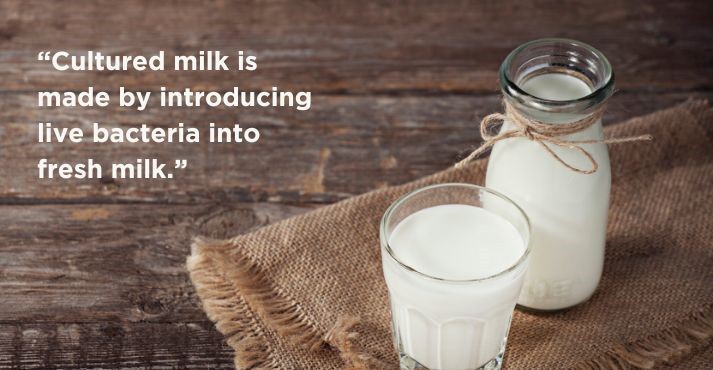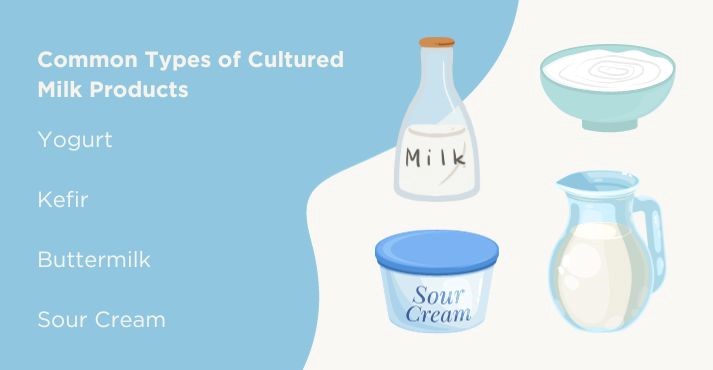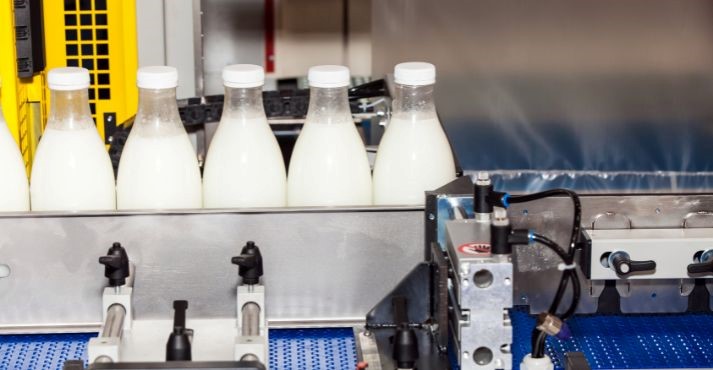Cultured dairy has been part of the human diet for years.
As the dairy sector trends evolve, this ancient practice not only extends the shelf life of dairy but also yields a rich array of products.
Cultured milk, also known as fermented milk, has high nutritional value, functional properties, and good sensory characteristics that are popular in the marketplace. Beyond its attributes, cultured milk supports gut health by introducing probiotics and enhancing digestion.
To make fermented dairy foods, you need two essential ingredients: milk and a source of beneficial bacteria. Cultured buttermilk, sour cream, and yogurt are the most common fermented dairy products.
But first, let’s explore what cultured milk means.
What is Cultured Milk?

Cultured milk, or fermented milk, undergoes a transformative process called fermentation, where beneficial bacteria or probiotics convert lactose into lactic acid, giving rise to a spectrum of unique and flavorful dairy products.
Cultured dairy products start with a milk base, and cream and milk powders are added to get the desired fat and protein content. Stabilizers may provide a good texture; sweeteners can be added to provide the desired flavor profile.
Here are the main components involved in the fermentation process:
- Substrate (Raw Material): The primary substrate is lactose, the sugar in milk.
- Microorganisms (Starter Culture): Lactic acid bacteria (LAB) are the primary microorganisms that convert lactose into lactic acid. Common strains include Lactobacillus and Bifidobacterium.
- Enzymes: Enzymes help break down complex molecules into simpler compounds. The microorganisms facilitate the conversion of lactose into lactic acid.
- Temperature: Fermentation is temperature-sensitive. The temperature at which fermentation occurs influences the growth and activity of microorganisms.
- Time: Allowing sufficient time for microorganisms to proliferate and metabolize the substrate is essential for developing desired flavors, textures, and characteristics in the final product.
- pH Control: LAB typically thrive in slightly acidic conditions, and their metabolic activity contributes to the acidification of the product.
- Oxygen Control: Fermentation processes are often anaerobic and occur without oxygen. Some microorganisms involved in fermentation are sensitive to oxygen, and its exclusion is necessary for their optimal function.
Common Types of Cultured Milk Products

Food manufacturers can produce a wide range of cultured products. There are so many types of cultured dairy available in the market today.
Here are some of the most common types of cultured milk products:
1. Yogurt
Creamy and tangy yogurt results from fermenting milk with Lactobacillus bulgaricus and Streptococcus thermophilus. It is enjoyed independently or as a base for sweet or savory dishes. Probiotics in yogurt support gut health, making it a nutritious delight.
2. Kefir
Kefir, a fermented milk probiotic drink, boasts a tangy effervescence. It offers a unique probiotic punch, fermented with kefir grains containing diverse bacteria and yeast. Its versatility extends to smoothies or enjoyed solo, promoting digestive wellness with each sip.
3. Buttermilk
Buttermilk, a byproduct of butter production or fermented milk, is tangy and slightly sour. Used in baking for a moist crumb or as a refreshing beverage, it adds a delightful acidity to dishes. Modern versions may involve cultured milk rather than traditional buttermilk.
4. Sour Cream
Rich and velvety sour cream results from fermenting cream with lactic acid bacteria. Its tangy flavor and smooth texture enhance both sweet and savory dishes. A versatile condiment, it’s a culinary companion in dips, dressings, or as a dollop atop dishes for added richness.
Health Benefits of Cultured Milk

As food science continues to evolve, the benefits of cultured milk are discovered. High in nutrients and probiotics, cultured milk is good for digestion and gut health.
Moreover, cultured milk products, such as yogurt and kefir, offer several health benefits due to probiotics, which are beneficial bacteria that promote a healthy balance of microorganisms in the digestive system.
Let’s explore the health benefits of cultured milk supported by relevant research studies.
Improved Digestion
Cultured dairy products contain enzymes and probiotics that help digestion, promoting a healthier gut environment. The fermentation of milk by bacteria leads to the release of various bioactive compounds that may have health-promoting effects.
According to a research study, people with irritable bowel syndrome and constipation who drank cultured milk with probiotics experienced decreased intestinal transit time, fecal pH, three markers of inflammation, and improvements in several constipation symptoms.
Probiotic Support for Gut Health
Rich in beneficial bacteria, cultured dairy beverages with yogurt and kefir contribute to a balanced gut microbiota, enhancing digestive health and potentially reducing inflammation.
Cultured milk can help prevent digestive issues such as diarrhea, irritable bowel syndrome (IBS), and inflammatory bowel diseases (IBD).
A research study revealed that yogurt or kefir with live, active cultures significantly enhanced lactose digestion and reduced lactose intolerance symptoms. Consumption of yogurt improved lactose digestion, as indicated by reduced breath hydrogen and improved tolerance.
Enhanced nutrient absorption
Probiotics in cultured milk can improve the absorption of nutrients, ensuring better utilization of essential elements by the body.
A research study on fermented milk showcased that probiotic fermented milk and yogurts are acidified and fermented by viable bacteria, usually L. bulgaricus and S. thermophilus, resulting in a thicker product with a longer shelf life.
Additionally, they deliver high-biological value proteins and essential fatty acids.
Management of Lactose Intolerance
Fermentation reduces lactose content, making cultured milk products more digestible for individuals with lactose intolerance. This can make cultured milk products more tolerable for individuals with lactose intolerance, allowing them to enjoy dairy without experiencing digestive discomfort.
Nutritional aspects of fermented milk study reveal that because of the breakdown of lactose during fermentation, the galactose concentration is higher in cultured products than in unfermented milk. Galactose usually is absorbed rapidly from the gut and metabolized to glucose in the tissues.
Potential Immune System Support
Milk and dairy products are known to contain bioactive compounds that are needed for many biochemical and physiological processes. Probiotics in cultured milk may positively influence the immune system, promoting defense against infections and illnesses.
Fermented and probiotic milk products are a source of beneficial live microorganisms, which results in immune system support.
A research study on health-promoting properties reveals that fermentation produces protein hydrolysates that are more absorbable than complete proteins, improve gastrointestinal health, reduce allergies/intolerance-related symptoms, and have immune-boosting effects.
Cultured Milk (FAQs)
Is cultured milk good for you?
Yes, cultured milk, like yogurt, is beneficial for health. It contains probiotics that support gut health, boost immunity, and aid digestion. Additionally, it provides essential nutrients like calcium and protein.
Is cultured milk pasteurized?
Yes. Cultured milk is pasteurized, which involves heating milk to kill harmful bacteria without significantly affecting its nutritional content. This process ensures product safety while preserving the benefits of cultured milk.
Is cultured milk better than regular milk?
It depends on individual preferences and dietary goals. However, both cultured and regular milk provide essential nutrients, and the choice depends on personal preferences and nutritional needs.
Conclusion
As the health trends in the beverage sector continue to evolve, cultured milk surges to promote optimal health and prevent diseases.
The fermentation process introduces probiotics, promoting gut health and aiding digestion. Rich in essential nutrients like calcium and protein, cultured milk contributes to a well-balanced diet.
Now that you know what cultured milk is, you can enjoy the health advantages, considering individual dietary requirements and potential lactose intolerance.





























